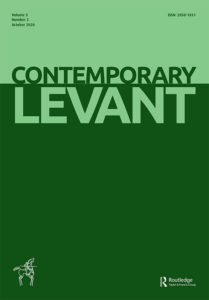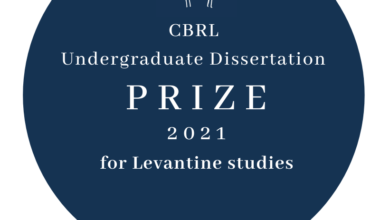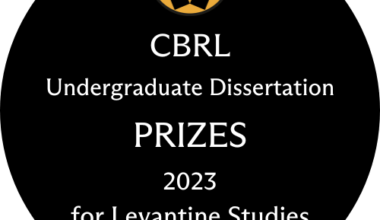
We are thrilled to announce that this year’s Contemporary Levant Best Paper has been awarded to Dr Anne Irfan (Oxford University), for her paper entitled: ‘Petitioning for Palestine: Refugee appeals to international authorities.’
The evaluating committee, made up of members of CBRL trustees and Contemporary Levant’s editorial board, selected the winning paper for its engagement with sources and for successfully pushing past the parameters of a well examined subject area to find a unique approach as well as advancing our understanding of the histories of petitioning.
The committee also awarded the 2020 Honourable Mention to Dr Muna Dajani (LSE/Lancaster University). Muna’s paper, ‘Thirsty water carriers: the production of uneven waterscapes in Sahl al-Battuf,’ was recognised for its empirically rich analysis and insight into struggles over water as opposed to oil that often garners more attention in the field of Middle Eastern studies.
The winning article will be available as open access in Contemporary Levant later this year.
Here is an abstract of Anne’s paper:
In the second half of the 20th century, stateless Palestinian refugees regularly submitted petitions to international authorities, particularly the UN. In these petitions, the refugees demanded their rights and invoked the UN’s liberal internationalist discourse to assert the justice of their cause. This article explores what these petitions reveal about contentious politics among the Palestinian grass roots in the refugee camps. In so doing, it recasts Palestinian refugee camp communities as internationally engaged and politically savvy, showing that they were key actors in the nationalist struggle. By unpacking the petitions’ internationalist aspects, the article also situates Palestinian refugee history within the broader context of post-war global governance. Finally, the analysis presented challenges the state-centrism of existing historiography on petitioning, which examines the practice largely in relation to the growth of the state. By contrast, the case study of Palestinian petitioning shows that the practice can also be important in a setting of statelessness. This article therefore makes a series of contributions to understanding not only Palestinian political history, but also the practice of petitioning and the dynamics of post-war internationalism.
Anne Irfan is Departmental Lecturer at the University of Oxford, where she is part of the Refugee Studies Centre. She was awarded her PhD in International History from the London School of Economics. Her work looks at refugee crises in the modern Middle East, and she is currently completing a book on the political history of the UN regime in the Palestinian refugee camps.
Muna Dajani holds a PhD in Geography and Environment from the London School of Economics (LSE). Her research examines water struggles in agricultural communities and the linkages between resources and the politics of belonging and recognition in the occupied Golan Heights and the Galilee. She has contributed to numerous studies on the hydropolitics of the Jordan and Yarmouk River Basins in addition to her research and interest in topics related to water, energy and climate justice. She is currently a Senior Research Fellow at Lancaster Environment Centre as part of Transformations to Groundwater Sustainability (T2GS) project which comparatively explores promising grassroots initiatives of groundwater governance around the world. She is also a Research Officer at the Middle East Centre at LSE, where she is leading on a collaboration project with Birzeit University on Mapping Memories of Resistance in the occupied Syrian Golan Heights. She is a policy member at Al-Shabaka, The Palestinian Policy Network.
Contemporary Levant is a peer-reviewed, multi-disciplinary journal that aims to foster research on contemporary politics, society and culture in the Levant region, its diasporas and neighbouring countries. The journal seeks to maintain a balance between empirical research and theoretical developments.
To find out more about submitting your work, please visit www.tandfonline.com/ycol. You can subscribe to Contemporary Levant through university library subscriptions and by becoming a member of CBRL.















